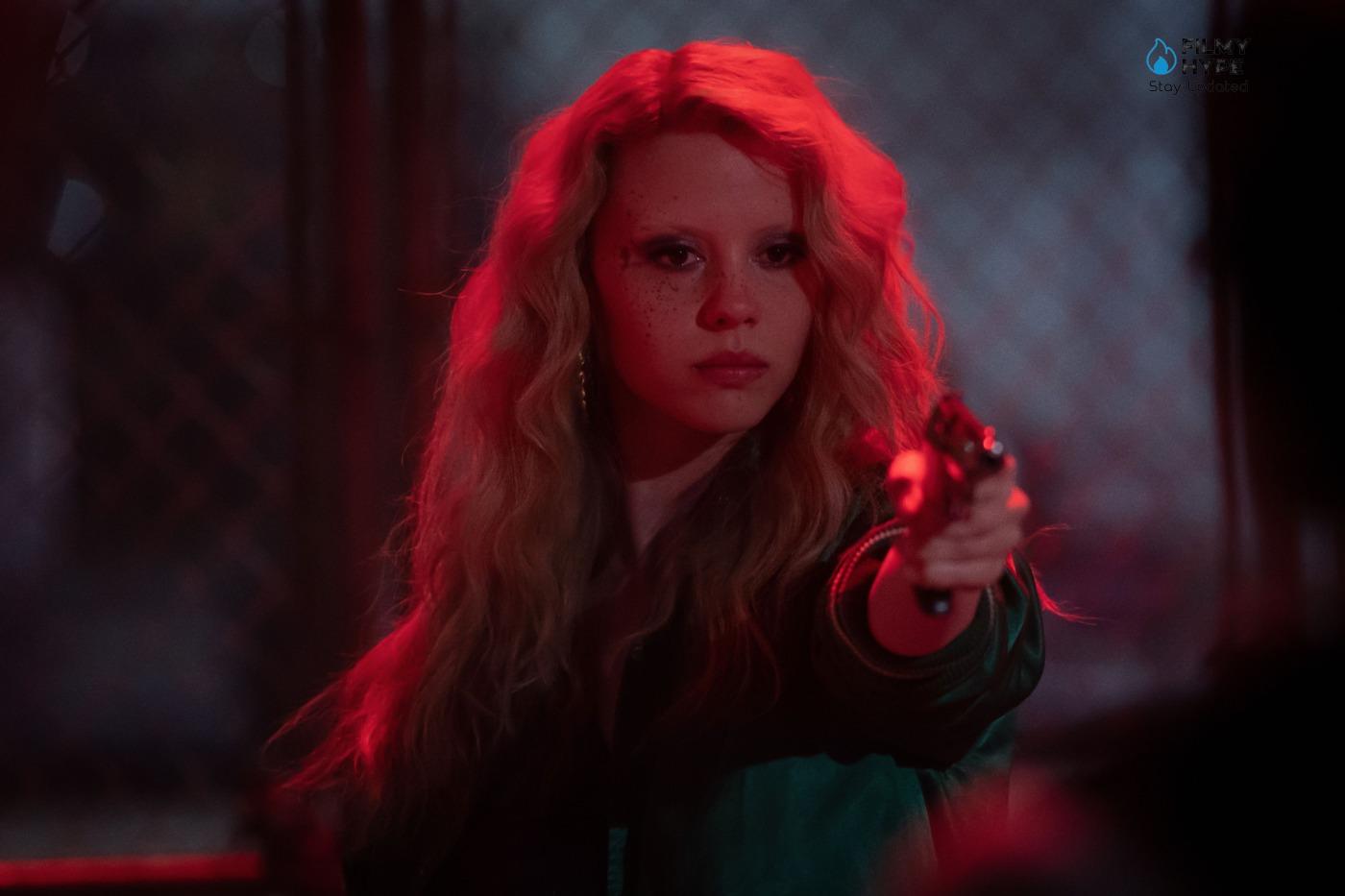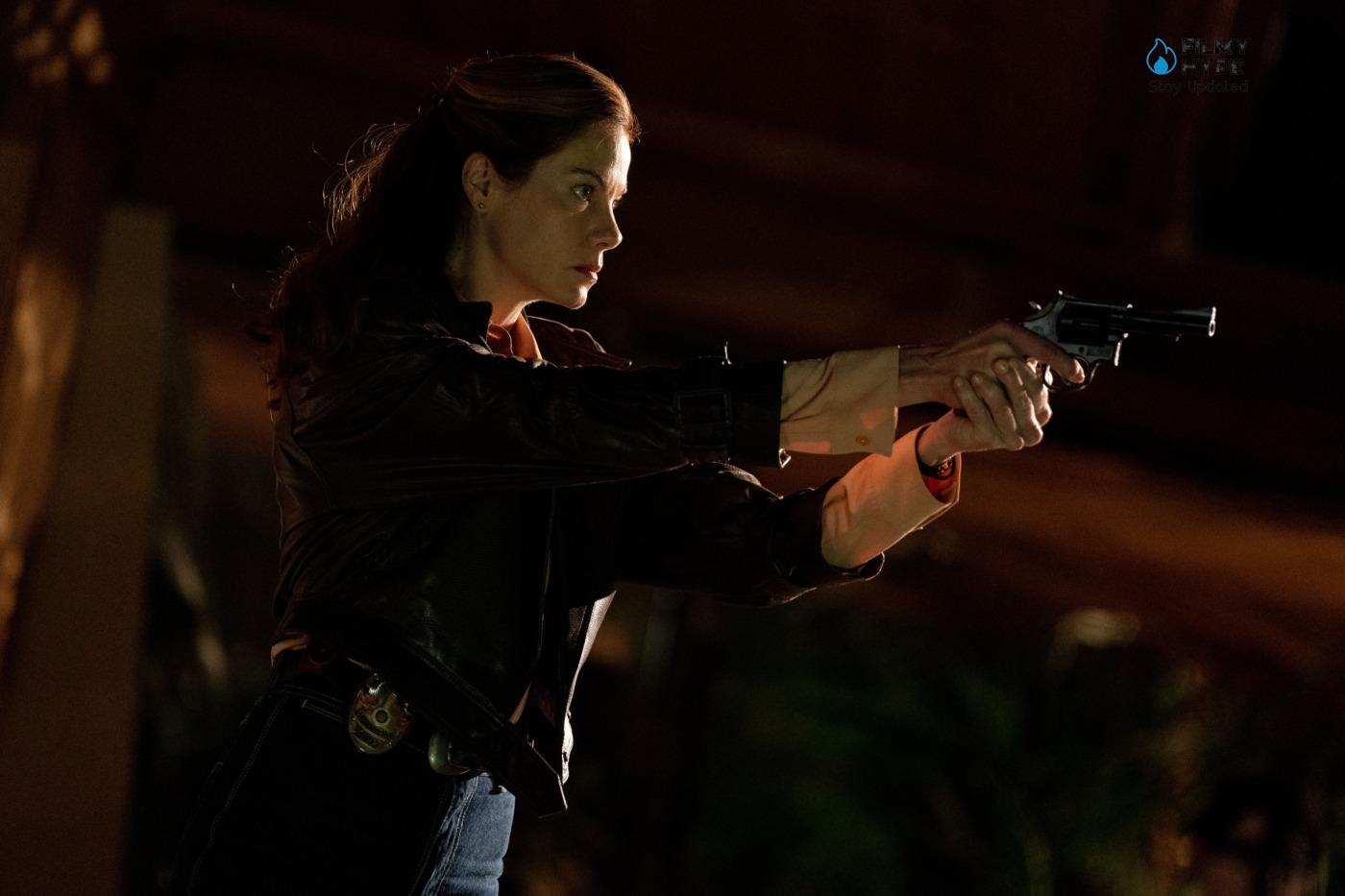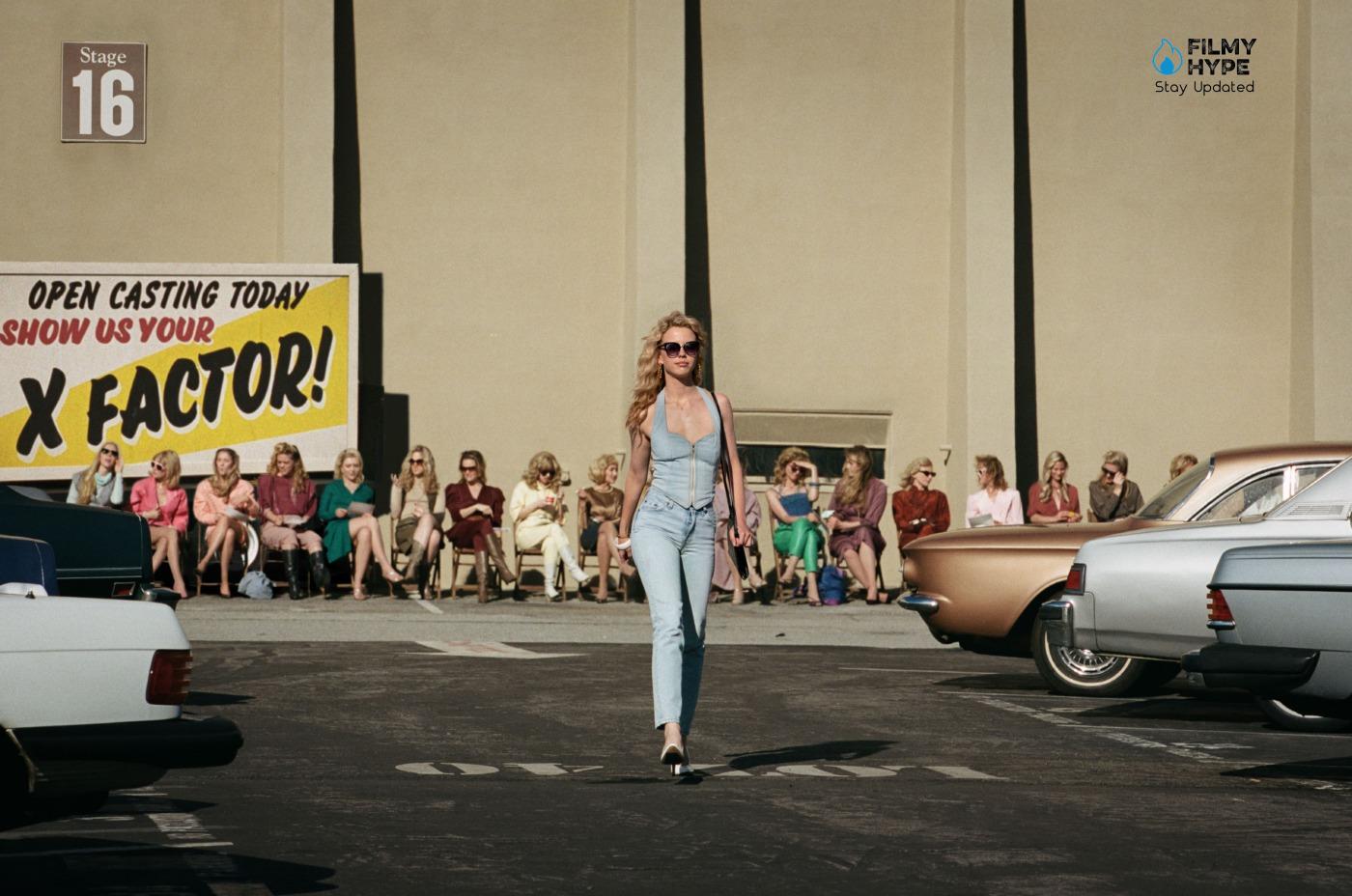MaXXXine Movie Review: A Film That Further Enhances the Talent of Mia Goth!
Cast: Mia Goth, Elizabeth Debicki, Moses Sumney, Michelle Monaghan, Bobby Cannavale, Lily Collins, Halsey, Giancarlo Esposito, Kevin Bacon
Director: Ti West
Where to Watch: In Theaters
Filmyhype.com Ratings: 4/5 (four stars)
Starring Mia Goth and directed by Ti West, MaXXXine, the final act of the “X trilogy“, More or less the idea of Ti West and Mia Goth when they started collaborating on X Movie was to stage a story about the dark side of the race to success through a metalinguistic discourse that reflected on horror in its meaning as an audiovisual language that was able to free cinema from the treatment of various taboos and to invert the role of sacred and profane. An initiative that found its origins in the work experiences of the two: outsiders compared to the big business circle in search of redemption through an operation that plays on this common status based on the artistic thought that best suits them. A winning project if you think about how Pearl, the sequel/prequel to the first chapter of the “X trilogy”, was welcomed by critics and spectators, and how the production level of the last act rose, the highly anticipated MaXXXine, in our theaters from August 21 distributed by Lucky Red, which is instead a real sequel to the 2022 film and has names in the cast such as Elizabeth Debicki, Giancarlo Esposito, Bobby Cannavale, Michelle Monaghan, and Kevin Bacon.

“I’m a fucking sex symbol,” Mia Goth‘s fearsome and seductive Maxine Minx said out loud to herself in front of the mirror of a seedy dressing room in a red-light club in the opening sequence of X Movie, reminding us all of a darker and more perverse version of Mark Wahlberg’s Eddie Adams/Dirk Diggler in Boogie Nights, Paul Thomas Anderson’s melancholic and unruly homage to American porn cinema between the seventies and eighties. Once again, a dressing room, a discourse of iron and desperate sexual self-emancipation, which, even though it comes from Martin Scorsese’s Raging Bull, PTA inevitably makes it even more intelligent and crazy. Just think of that prosthesis that Wahlberg unexpectedly shows off, sparking critical discussions – and not only – that have lasted for decades and have continued to this day. Like Adams/Diggler, Maxine, is aware of her talent, dreams of success, and choosing to escape from something or someone. Maybe the past, maybe much more. But as we all know, the past always returns to find you.
MaXXXine Movie Review: The Story Plot
Let’s leave Pearl’s story aside and pick up Maxine’s (Goth), who eight years after the unfortunate events that involved her in X Movie, has made a name for herself in red-light cinema and now wants to make her final leap to Hollywood with a role in a horror sequel that promises to be a sure success, Puritan II, directed by the brilliant and icy director, Elizabeth Bender (Debicki). It is she who sees in Maxine that familiar ferocity that can allow one to survive in Hollywood in 1985. Yes, because the Hollywood of 1985 was the maximum expression of that great dream machine founded on the pain of the defeated and the depravity of the powerful who commanded it. A system that, while living off serious idiosyncrasies and opportunistically settling on bigoted rules, was based on feeding on the basest instincts of man and then reselling them wholesale. That’s why everyone who lived outside of it hated it, even if their secret ambition was to be accepted into its ranks.

Not only that, if it is true that Hollywood in 1985 was the absolute evil, it is also true that it often inspired other evil, such as that represented by the serial killer, The Night Stalker. A sort of black spirit that punishes with death those who sell their body and their morals, such as prostitutes, underdogs, videotape dealers, or, perhaps, red-light stars seeking success on the big screen. A list that can potentially include Maxine, who however seems more worried that a two-bit detective (Bacon) might reveal the truth about her past. The girl is truly gifted with that ferocity that the cold and brilliant director saw in her and is willing to do anything to participate in the film that can give her success, even becoming part of an evil greater than that represented by a serial killer like The Night Stalker. Anything to go down in History, anything to become famous, anything to “just accept the life I deserve”.
MaXXXine Movie Review and Analysis
The incipit is the same as X Movie, and that’s enough to understand that Pearl was nothing more than a brief interlude between the two films. And not by chance, we are talking about a prequel spin-off, more than noteworthy and that in a certain sense fit into the meta cinematographic discourse that Ti West strongly wanted to carry forward with this beautiful trilogy. The leap of a decade is clear from the start. The Seventies of the first film are left behind, with those hot desert lands of the American province, made of madness and mystery. Now we are in the Eighties, brought back into fashion in a nostalgic manner, despite itself, by Stranger Things and observed from various points of view in this MaXXXine. Points of view, above all cinematic. The large white screen of the room is cut into several parts again. From a 4:3, formed by the doors of a large hangar usually used as a set, and now an audition room, our Maxine enters the scene, effectively piercing the screen and revealing the trick. Not the zoom that approaches the cursed house of the first film but directly the entrance of the protagonist, who will give a (double) interpretation of the highest level.
From here on, Ti West will take us into the horror of the golden decade for popular art, which marks a very important era, especially for the horror genre. From the very beginning, the camera the director specializing in horror (rather mediocre, to be honest), begins its real parade of tributes, starting from the beginning, from the great master from whom the great masters have drawn freely: Alfred Hitchcock. Inside the studios, the set of Psycho becomes the object of very bad memories for Maxine, but also a safe place to escape when needed. It starts with Hitchcock and always returns to Hitchcock. The film thus branches out into many small cinematic paths, which originate from the King of Thrills to then arrive at quotes and tributes to his direct descendants, collected in a great unicum in the sequence of the murder committed in the video store. We will not go into details to avoid running into annoying spoilers. However, in those minutes, we see a real concentration of Mario Bava, Dario Argento, and Brian De Palma.

A triptych that is impossible to remain indifferent to, between colors and close-ups of knives that tear the skin and attack the chest, like in the famous sequence of Suspiria. The Argentine ferocity, in short, will certainly not be lacking, on the contrary. Homages and citations, therefore, are also expanded in the characters, from the detective played by Kevin Bacon, the perfect villain, to the always fantastic Giancarlo Esposito. In short, everything is organized to perfection, in MaXXXine. Not a comma out of place, although the script tends to limp too often, especially in the construction of the final twist, too banal if you paid attention in the first film. Things of little importance, apart from everything else, given the fact that in cinema it is and will always be more important the ” how ” and not the “what“. In this sense, MaXXXine proposes itself as the perfect final gloss of a beautiful journey into horror, a perfect continuation of what was expressed in X – A Sexy Horror Story.
High practices and low practices, to quote the great Callisto Cosulich, which are again taken into consideration by Ti West, focusing this time on the horror genre. If in the first film, the young director wanted to “give dignity to the porn genre”, making the film they were shooting, real cinema, the theme here shifts to a genre that is still more than controversial today. Put on the same level as porn, horror is also trivialized as a secondary gateway to great cinema, a broken springboard because the face lent to the genre, becomes a true mark of infamy (forgive the out-of-context spoiler). Only tenacity can ensure that we go beyond this Manichean subdivision, but to what extent is it actually possible? Very simply, the answer that Ti West gives us is gentrifying the genre; cleansing it of the violence and ferocity shown, in favor of images that leave to be understood, then leaving space for the actors, for their interpretations, exalting their skill. Not just scream queens but depth tout court.
Despite the various vicissitudes and changes in tone and register of the X trilogy, MaXXXine is, ultimately, an incredibly linear conclusion and consistent with the spirit of the films to which it is linked, perhaps also thanks to the supervision of the entire project by A24. Just think of its premises: if you begin a story in which you want to talk about an age-old disease because it is extremely tied to human nature such as the pursuit of success at all costs, you cannot help but think of a climax set in Hollywood. The film immediately presents itself as a film with a metalinguistic nature, tying into the previous chapter, but at the same time “imitating” it. The opening credits recall Flashdance, where Pearl’s were based on 50s classics, and the introduction of the protagonist comes in a successful audition where the unsuccessful one became the trigger for the protagonist’s madness. In addition, here too, as before, there is no lack of cinephile research (and how could it be, given the location), through many references that range from Chinatown to Psycho, passing through the first slasher sequels and even something about Hammer.

All postmodern condiments are articulated on a rocky thematic discourse that uses the metaphorical power of horror to talk about a secular demon that passes from generation to generation and from person to person without interruption. Hollywood therefore becomes more and more a sort of black Church, with its detractors coming from other cults (smaller but always linked to the same divinities), its priests, its altars, its martyrs, and its chosen ones. It is no coincidence that the main environmental leitmotif of the trilogy is the re-proposal of Catholic symbolism, present without ever falling into the caption. In conclusion, MaXXXine is a bit of a perfect union of the two artistic souls behind the project as a whole, since, as Mia Goth is impeccable in the role of the messianic monster girl (in the sense of prodigy, but also in what Bette Davis means in the opening sentence of the title), so Ti West is even more present than in the other two chapters. A communion of intent comes out, especially in the third act of the film, since it takes care of making the viewer return to the origin of what moved the beginning of the trilogy, closing a thematic and linguistic circle that perfectly describes the soul of the operation.
Far away from the X and Pearl slaughter farm, we find Maxine where it was certain from the beginning that she would end up, Hollywood. And yet, once her dream has been achieved, nothing or almost nothing is as she expected. Porn is too small for her, but it makes money, and the A-list cinema does not seem at all inclined to lay its languid and dangerous eyes on her, or at least… not yet. When it happens, however, cinema and reality merge and confuse. Maxine’s first horror feature film meets the equally macabre and bloody past that she experienced and never really elaborated on. The set is tinged with red, but the evil is not reconstructed, rather it is real and has a name, Nightstalker. Ti West closes the circle around his passionate, nostalgic, and cinephile trilogy about America changing and so also cinema, with probably the most personal, sweet, and thoughtful chapter regarding the evil force that lurked before and that still lurks in the pomp and idyll that Hollywood represents for all those who, without ever losing heart, have chased and admired its purest and most memorable attractions, therefore the films, the scandals, the stories of rebirth and also those of fall, in the hope of one day finding themselves among them.
Hollywood is not only the magic of the set, brazen auditions during which you show yourself and sell yourself shamelessly for what you are, but above all for what you are not even remotely but that you can become on request, surrounding yourself with stars and divas protagonists of the star system of the 80s and so authors, famous journalists, agents and so on, forgetting about your reality and identity since everything is at the service of the show, from the bodies to death. The Hollywood that Ti West tells is the daughter of a James Ellroy on acid, capable of finding the rotten and the violence, even where hidden by exorbitant quantities of lights, makeup, and diamonds. The higher you climb, the easier it is to find the fall, that’s why the Hollywood Hills, that’s why Olympus is a mere and tragic illusion and place of the end, therefore of a new beginning.

Even though the structure is once again that of a slasher, guaranteed by the presence of the fearsome and curious serial killer baptized by the media as Nightstalker, this third chapter of the trilogy, which most likely does not yet represent a definitive conclusion to the narrative arc of Maxine Minx, considering the recent statements released by West during the advertising campaign for MaXXXine, it is in the unbridled, bizarre and citational pulp fun of its own stylistic and narrative matrix from exploitation cinema, that the film traces its soul. Once upon a time… in Hollywood according to Ti West. Which, as Tarantino teaches, is the land of dreams and the land of evil. Mia Goth, an extraordinary actress who not only plays the craziest and wildest scream queen of our generation, also writes the chapters of this increasingly interesting and promising horror saga, together with her life and career partner Ti West, carrying the film on her shoulders, this time surrounded by a stellar cast that includes names like Elizabeth Debicki, Michelle Monaghan, Bobby Cannavale, Lily Collins, Giancarlo Esposito and… Kevin Bacon.
And it is precisely from the detective played by the latter that West’s proudly citational and cinephile soul is born, which, passing through Jack Nicholson’s Jake Gittes, the absolute protagonist of Roman Polanski’s memorable Chinatown, also finds the dark, mysterious, and subtly horrific tones of Billy Wilder’s Sunset Boulevard, passing through Alfred Hitchcock’s Psycho – Norman Bates’ house as a refuge. Or is it another trap? The mother is in the cellar, who is waiting for Maxine instead?, the melancholic pain of Robert Altman’s The Long Goodbye and still suggestions from Dressed to Kill by Brian De Palma, Abel Ferrara’s Angel of Vengeance, and David Lynch’s Mulholland Drive. MaXXXine is the final act of the “X trilogy” conceived and directed by Ti West in collaboration with Mia Goth, who appears in each film. A film that very well closes the thematic and linguistic circle set up by the previous titles, continuing with the postmodern and playful spirit that moved the entire operation. A great story about a divine, but secular, evil that once again exploits the ability of horror to potentially be the most metaphorical and liberal genre in the cinematographic panorama.
MaXXXine Movie Review: The Last Words
Maxxxine is the perfect point of this trilogy that can entertain and make you reflect on the state of cinema, genre, and otherwise. A film that further enhances the talent of Mia Goth, who in three films has actually played two characters profoundly different from each other one of which, with very particular evolutionary nuances. And long live horror, in all its forms. The cast is rich, unfortunately with names like Giancarlo Esposito and Kevin Bacon not exploited enough compared to their potential, but the real center of everything is Mia Goth’s Maxine Minx. Always original and never banal in her choices, with this role the actress consecrates herself not only as a scream queen but also as a true star.






